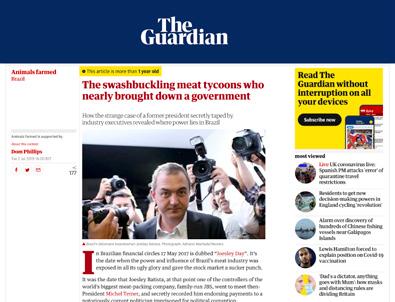
3 minute read
Risk factor: corruption

‘It was the rule of the game. […] Corruption was on the upper floor, with the authorities.’ 52
Joesley Batista
‘Strong political connections and financing from stateowned banks facilitated the growth of JBS and other group companies. The family and its companies are now implicated in politically-linked corruption investigations.’ 53
Debtwire, October 2016 While JBS was founded by José Batista Sobrinho, most of the company’s expansion has come under the leadership of his three sons: José Batista Júnior (known as Júnior Friboi), Wesley and Joesley.54
The Batista family also owns a significant share of JBS, via holding company J&F Investimentos. According to the 2017 US Securities and Exchange Commission filing, ‘J&F is owned, indirectly through several Brazilian holding companies, by the Batista Family’ including JBS founder José Batista Sobrinho and five of his children.55 As of 25 June 2020, the Batista family’s investment arm held a 40.03% stake in JBS,56 with an additional 2.3% stake held by JBS itself and classified as ‘treasury’.57 The Brazilian government’s BNDES bank is the second-largest shareholder of JBS, with a 21.32% stake.58 Foreign investors – including international banks, investor funds and sovereign wealth funds – appear to hold at least 16% of the group, according to Bloomberg.59
According to Debtwire, the Batista family’s political links and relationships with government and the state, and particularly its ties with state-owned banks, have been key to its growth. BNDES provided financing to JBS for its landmark acquisitions, including Pilgrim’s

Pride (see page 29).60 Debtwire reports that, according to campaign finance disclosures, JBS was the largest donor in Brazil’s 2010 and 2014 presidential election campaigns.61

In 2017, as part of ‘Operation Carwash’, a multi-year probe into corruption involving Brazilian politicians and businesspeople, Brazil’s Federal Police exposed bribery by JBS executives on a truly massive scale. As the Bureau of Investigative Journalism summarises it, the targets stretched ‘from meat inspectors to the highest office in Brazil: Temer’ (Michel Temer was at that point the country’s president).62 As a result of the investigation J&F Investimentos agreed in a leniency deal to pay R$10.3 billion ($3.2 billion) – one of the biggest fines in global corporate history.63 On this occasion Wesley and Joesley Batista escaped prosecution through a plea bargain with government prosecutors, but they admitted to having bribed close to 1,900 politicians.64
In September 2017, four months later, the Batista brothers were arrested on allegations of insider trading involving the sale of large numbers of shares in JBS in the weeks before they admitted to the bribery of high-ranking officials (an admission that caused such a dramatic collapse in share

prices that trading on Brazil’s stock exchange was temporarily suspended).65 In 2018 the brothers spent several months in jail for having failed to admit to this insider trading as part of their plea testimony during the Operation Carwash investigation, and they were banned from management positions in companies owned by J&F Investimentos, including JBS.66
Nevertheless, at the end of May 2020, Brazil’s Superior Court of Justice authorised Wesley and Joesley Batista to return to their positions in J&F Investimentos and its subsidiary companies. The court ruling indicated that it was essential for Brazil’s national economy during the pandemic for the brothers to return to management in order to make decisions that would safeguard production, jobs and tax collection at J&F Investimentos companies, which reportedly supply 25% of Brazil’s food market.67
Allegations of financial misconduct associated with JBS are not exclusive to the Batista family. Early in 2020, the CEO of JBSowned Pilgrim’s Pride was one of four current and former chicken company executives indicted in the USA for conspiring to fix prices and rig bids for broiler chickens from at least 2012 to 2017.68











